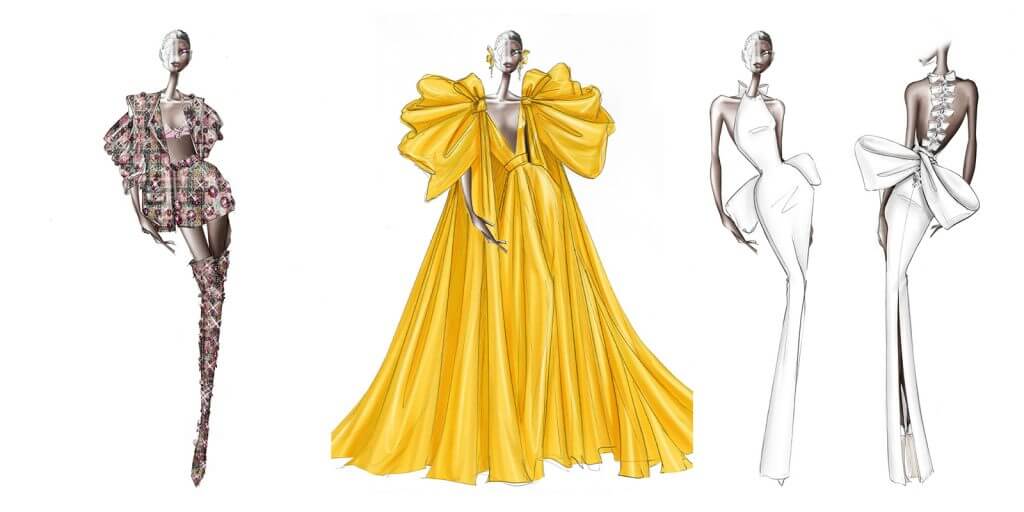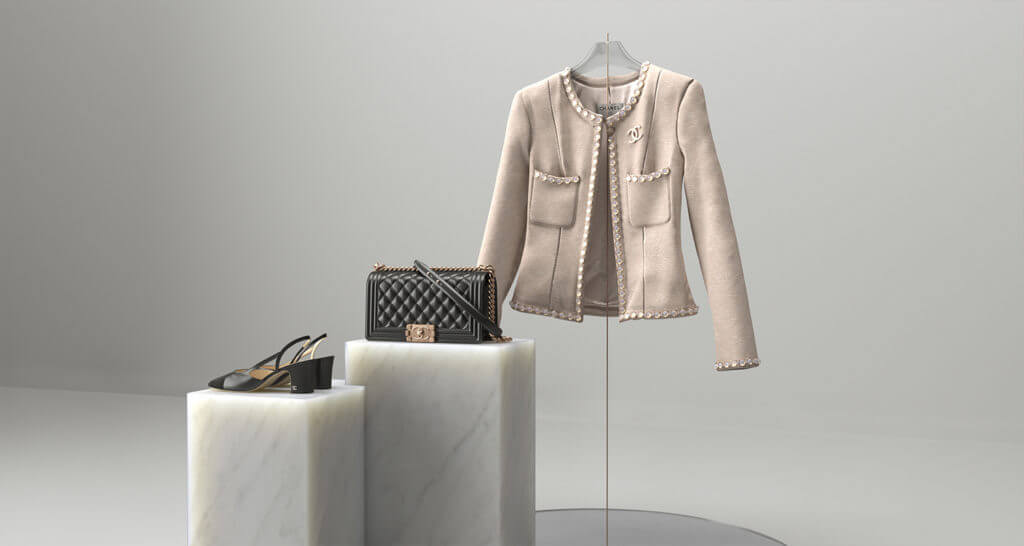The fashion industry is where trends come and go. While some trends stay for a long time, others quickly fade away. Every fashion brand has to be aware of the new trends going around in the industry. Currently, digital trends in fashion in conjunction with the metaverse are what everyone is talking about.
Hence, this blog will take you deeper into the following aspects:
Download our FREE Digital Fashion guide below!
Download the Guide
Digital Trends in Fashion Industry
Digital Apparel
The biggest digital trend that is creating both excitement and hope among designers, influencers, environmentalists, and fashion lovers is digital clothing. These garments will only exist in virtual form in a digital catalogue. Consumers can use them in digital worlds, games, or neatly overlay them on their pictures. Even though buyers can never really wear them, the demand for them is going up every day.
From the digital catalogue, users can try on unlimited clothes from their space in a short span of time. As a result, digital garments have become a mode of fun to try and shop.
Digital skins were already in use in the gaming world but they came into more focus after the pandemic. Some of the fashion brands launched their collections creatively through 3D digital clothes in the past two years.
Virtual Models
With the pandemic and social distancing rules, fashion labels could no more have lavish physical runways with human models gracing them. To keep up with the launches and collections display, virtual models have come into the picture.
Designed and created by a 3D digital studio like ours, virtual models just look as realistic as real models. Unlike human models, brands can use one virtual model to display all of their gorgeous collections with little effort and time.
Games and Fashion
With a creative twist, global fashion brands are now launching their new collections in the gaming world. Gamers can buy digital skins and accessories, allowing them to fully express themselves as they play. These digital garments are very popular among the Gen Z generation.
The top luxury brand, Balenciaga collaborated with Epic Games for the first-ever Fortnite luxury collection. Also, Louis Vuitton partnered with Riot Games on virtual skins for the League of Legends World Championship Finals in 2019. The British luxury fashion house, Burberry brand has created skins for Tencent’s Honor of Kings characters.
Putting everything together, the list of luxury brands and games partnerships is increasing. This digital trend in fashion where brands partner with games to attract Gen Z is going to be huge soon.
NFTs
Luxury fashion brands have always struggled with counterfeits circulated in the market. A new type of cryptocurrency helps fashion houses prevent any fake goods to reach loyal consumers. When fashion brands mint their digital haute couture and accessories as NFTs, they can easily track the ownership.
Non-fungible tokens are impossible to copy and the ownership records cannot be changed. Since every transaction detail is added to the ledger, brands can easily track their real goods. Also, buyers can verify the information before moving on to purchases.
Metaverse Boom
The biggest digital trend in fashion spans other trends in the rise of the metaverse. In an online world, totally controlled by computers, consumers can live, play and shop around, just like in real life. This opens a lot of possibilities for expression, fun, economic opportunities for both creators and customers.
Virtual models wearing digital clothes can walk on the digital runways in the world. And Buyers can experience real impressions of products with AR and VR technology. They can also buy digital fashion in the form of NFTs in the metaverse.

In near future, fashion brands will have digital catalogue from which users can try on in the virtual stores in Metaverse
Interested in Digital Fashion? Download our FREE guide below.
Download the Guide
The Need for Virtual Fashion Assets
Digital Appetite
The advancements in technology have brought revolutionary changes in people’s lifestyles. From tangible products, consumers’ inclination shifted to intangible experiences. They crave digital means that not only allow them to express themselves freely but connect with like-minded people.
Due to the growing digital appetite, consumers prefer assets in a digital catalogue to use in online universes like a metaverse. Therefore, brands have to start to create digital assets like virtual clothes and accessories to quench the new consumer domain wants.
Users use these virtual collectibles to dress up their personal avatars, add to their photos, and post on social media. In addition to sales of virtual goods, brands can take advantage of virtual experiences using AR and VR technologies. Both of these
Both of these digital trends in fashion not only boost revenue but also help in between reach across the world.
Customization Appeal
From limited to mass production, the fashion industry has grown over in leaps and bounds with general designs and collections. This trend of generalization is slowly turning into a fad. Customers, these days, want their consumption to reflect a part of themselves.
This diverse desire of new consumers brought in customization. It is a process by which fashion labels create products with additional personalized features of the target audience. It is obvious that personalization is quite difficult and costly when it comes to physical goods.
On the other hand, virtual goods which only exist on computers and other electronic devices can be modified limitlessly. Due to this ease, virtual goods are digital trends in fashion, soon a game-changer in terms of consumer satisfaction.
Emotional Bonding
In the 21st century, consumption is no more physical activity. A new element has been added to it – psychological connection. In addition to customization, buyers also want to bond with the brands. When they feel that their desires and preferences are being heard by the brands, they feel emotionally bonded.
To boost audiences’ emotional connectivity and loyalty, brands can create virtual assets that speak of their consumers.
Diversity and Inclusion
Besides catering to global audience purchases, virtual goods also help in bringing every consumer together. As these garbs can be modified and produced without end, everyone can try and purchase them. There will be no limited stock or limited size or color restrictions.
Through digital garbs, brands can create a diversified and inclusive community online. As a result, this gives a social boost to brands’ presence, both in the online and offline worlds.
Environmental Protection
Finally, digital trends in a fashion not only have intangible, emotional, or social benefits but also protect the planet. As the second-largest polluter in the world, the fashion industry bores more responsibility than any other industry. To keep corporate duty and consumer satisfaction balanced, virtual fashion is essential.

From Traditional culture, Luxury Fashion brands are slowly moving into the digital means.
How to Align Your Brand with Digital Trends
3D Rendering
3D Rendering is a form of creating realistic visuals using software on computers. Without the need for a photography crew, 3D artists can create stunning designs with virtual models flaunting the collections. They can document all of the designs in a digital catalogue for buyers to browse at anytime.
3D rendered visuals are easy to create, edit and modify in terms of cost, time and effort. Luxury brands looking to keep with the digital trends, contact us today for splendor 3D content.
VR Experiences
To align fashion houses with metaverse, branded VR experiences are a must. These experiences take the consumers on a realistic journey into the virtual world while being in their physical spaces. Recently, AR and VR content is loved by many consumers as they can feel the product with complete information.
Augmented Reality Filters
To connect consumers with the latest trends in fashion, AR filters are great too. Popularized by Snapchat, augmented reality filters overlap reality with digital content. Customers can try on digital clothes, personal goods with a few clicks on electronic devices.
The Future of Fashion: Virtual Garbs in Metaverse
Analyzing all the digital trends in fashion leads to one conclusion – The future of Fashion is in the Metaverse. As anyone can be in the online world, luxury fashion labels have to have a virtual garment strategy.
By partnering with a 3D studio like VSLB, brands benefit from 3D garbs created with our unique artistic direction. We have a diverse digital catalogue of virtual fashion assets to help you create your first 3D clothing.

